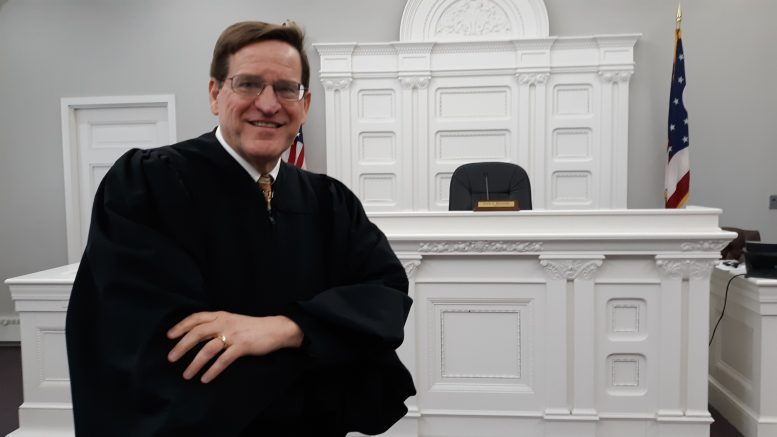By JAN LARSON McLAUGHLIN
BG Independent News
Probate court has a deceptive reputation of being the court of bland paperwork. But it actually can be the warehouse of the weird.
“A lot of people refer to it as the ‘quiet court.’ You don’t hear about it a lot,” said Wood County Probate and Juvenile Judge Dave Woessner.
But the reality is far from that reputation.
“When the legislation doesn’t know where to put something, it goes to probate court,” the judge said. “It’s the depository of strange things.”
Woessner has presided over cases where two women married to the same man (at the same time) showed up to claim his body in the morgue. It was up to the judge to decide if a person could legally change his name to “Elm Tree.” And it was his job to preside over a case where three siblings were fighting over their deceased father’s old S-10 pickup.
“We had a whole trial over that,” the pickup truck, Woessner said.
Dividing up estates after a death
Many of the probate cases deal with property left behind when people die.
“Dispute over property can get just as contested as custody court,” Woessner said. “These are highly emotional cases.”
He was seen families feud over items like an engagement ring and a farm tractor. He has also seen families wage war over funeral bills – after a survivor disagreed with how much money was spent on a loved one’s coffin and service.
“It’s a very interesting dynamic we see in families,” he said.
“No matter how good families get along, it doesn’t take much for families to go sideways.”
One of the more surefire ways to stop conflict before it starts is for people to videotape their wishes.
“It’s very difficult to say grandma or grandpa didn’t know what they wanted, when they are looking at you and talking about it,” Woessner said.
Many people try to avoid property being divided up in probate court – and Woessner isn’t offended by those efforts.
“There are ways to keep stuff out of probate. Do as much as you can do ahead of time,” he said.
Of course that wasn’t possible with a case handled years ago by Woessner when a resident of Wood County died unexpectedly. His wife from Wood County was in the morgue with her late husband, when a second wife from Michigan showed up. The man had families with both women – neither who knew about the other.
“These people are emotionally upset because of the death,” then they find out their loved one had dual families.
In that case, Woessner had to rule on the disposition of the body.
“It needed to be done fairly quickly,” he said.
Probate court also has decide on disinterment requests – when the family wishes to move their deceased loved one to another cemetery. Sometimes the issue involves the family moving and wanting their loved one to be in a cemetery near to them, or sometimes the family may object to the cemetery conditions.
By law, Woessner is required to ask certain questions before allowing a body to be disinterred – like if the deceased died of a contagious disease.
More pleasant responsibilities
Probate court handles marriage licenses, granting them the same day unless there are issues with an applicant’s identity.
“This is a busy time in May and June” for marriage licenses, the judge said.
As probate judge, Woessner also has the authority to perform marriage ceremonies.
One of the happier roles of probate court is overseeing adoptions.
“That is one of the more positive things we do,” Woessner said. “It’s the beginning of a stable, permanent family for children. That’s a nice thing when we have people willing to do that.”
Since Woessner also serves as juvenile court judge, he is sometimes familiar with the children going through the adoption process.
“I’m in a unique position,” he said. “Some of the kids have come through juvenile court as abused or neglected children.”
People wanting to legally change their names also must come before the probate court. In most cases, it’s because someone has been spelling their name differently for years and Social Security won’t accept that spelling.
But sometimes, people are looking for a bigger change – such as the man who asked that his name be legally changed to Elm Tree. Woessner approved.
Not all name changes are allowed, like the man who applied to change his name to Santa Claus. The judge in that case rejected the request out of concern that when the man died his obituary would read “Santa Claus died,” which could be quite upsetting to children.
“It’s an area that doesn’t fit anywhere else,” Woessner said of probate court being assigned name change requests.
Other issues handed off to probate courts include:
- Eminent domain disputes. Some of these can involve big money, like the $1 million jury verdict against Toledo Edison when it put in power lines north of Bowling Green.
- Appointment of park commission members, like the Wood County Park District.
- Involuntary hospitalizations for people with mental illness. Woessner estimated he sees between five and 10 of these cases a year. “Those are difficult cases,” he said.
- Adult Protective Services cases, which are seeing an increase. Not only is the local population aging, but more people are now required to report suspected abuse, neglect or exploitation of older adults.
- Appointment of new township trustees or school board members if those entities can’t agree on who to appoint.
- Guardianship orders, for people not able to take care of themselves due to physical, mental or dementia issues. Probate court has set up a program that assigns volunteers to act as guardians for people who don’t have family to do so.
“When there’s a question of whether something doesn’t fit anywhere else,” it comes to probate court, Woessner said with a smile.


